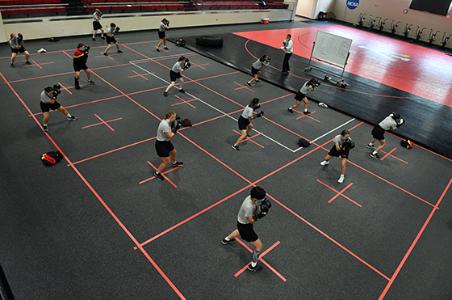2020-2021 | Love Named Chief Diversity Officer at VMI
Boxing Adapts to COVID Era

Rats participating in a women's section of PE 102 - VMI Photo by Mary Price
LEXINGTON, Va., Oct. 14, 2020—The coronavirus pandemic has forced numerous adjustments to nearly all aspects of life in higher education—but perhaps the thorniest problems of all are found in the realm of contact sports, where sweaty participants are in close physical proximity.
At VMI, one of the biggest challenges this spring and summer was trying to find a safe and effective way to teach boxing, a longtime required course for all rats. And thanks to the efforts of Col. James “Jimmy” Coale, professor of physical education, and his colleagues, rats enrolled in Physical Education 102, the required boxing course, are learning to box in a way that’s designed to minimize health risks while maximizing skill development.
Funding from the dean’s office has made COVID-safer boxing possible. Coale explained that the money allowed the department to purchase a variety of items, including eight stand-alone punching bags, 40 pairs of new gloves, a heated dryer for those gloves, a speaker system for the instructor, and more.
A visitor to Cormack Hall, where boxing classes are now held, would find each cadet in boxing classes assigned to a 10-foot square on the floor of what’s usually the NCAA wrestling area. During the entirety of the class, cadets stay in their own numbered squares as they move, jab, and punch, unless they are released to go work out with one of the punching bags.
But before cadets even go to their squares, they must pick up their gloves, which are assigned to them by number. At the end of each class, cadets sanitize their gloves and place them on the dryer so they’ll be ready for another cadet the next day.
Throughout the class, cadets are instructed to work on specific skills while Coale demonstrates from the front of the room. If he needs to work one on one with a cadet, Coale reaches for what he calls his “COVID stick”—a wooden pole with a boxing glove attached to it—and demonstrates from a safe distance.
Sparring, long a staple of VMI’s boxing classes, has had to be eliminated due to the coronavirus. Instead, cadets will have their skill levels assessed via a video in which they demonstrate specific skills taught in the class.
Coale has taught boxing at VMI for an incredible 41 years, and his decades-long perspective allows some insights into the newly revamped class.
“We give up a little bit … but we also gain some things,” he commented. “At the end of the day, they learn some more combination punches. Before, it was just the one and the two, and now it’s six punches that they’re learning. The movement part is much better, which is one of those foundational skills in boxing.”
As the semester has progressed, Coale has observed that cadets have more fluid, natural movement in his classes than they once did—likely because the no-contact nature has eliminated the fear of getting hurt.
That change has prompted a new thought for Coale, which he stresses is just an idea so far: perhaps VMI should teach boxing in its current, no-contact form so cadets can learn foundational skills, and then offer a sparring class as an elective.
“This gives you more time to learn the basics,” he commented.
But no matter what approach is taken to teaching the class, Coale is a believer in VMI’s boxing requirement.
“I think it’s important for [boxing] to be here,” he stated.
Coale recalled that when the late Dr. Clark King hired him in 1979, King stressed that with boxing, cadets must make themselves vulnerable to being hit in order to have any success.
“That coincides with the philosophy of VMI of taking risks, of putting yourself out there, getting out of your comfort zone,” said Coale. “I think boxing really fits nicely into that.”
Mary Price
Communications and Marketing
Virginia Military Institute
.svg)
.png)